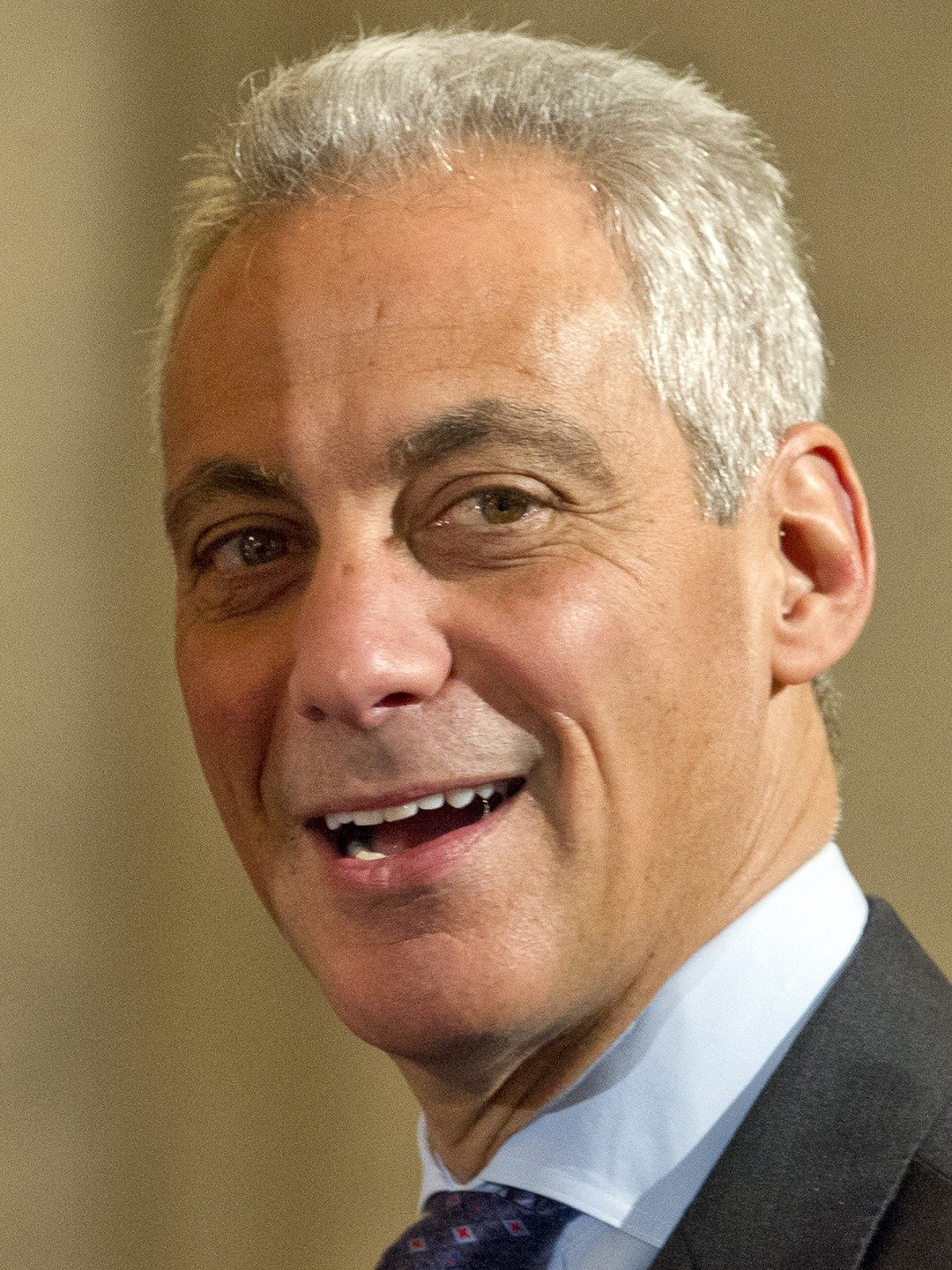It's a curious thing, isn't it, how much interest people have in the financial standing of public figures? You know, when we think about someone who has spent a lot of time in the public eye, like Rahm Emanuel, questions about their financial situation often pop up. My text, for instance, talks quite a bit about Jon Rahm Rodríguez, the amazing Spanish professional golfer. It details his incredible career, how he was number one in the world amateur golf ranking for a long time, and even his wins, like the Masters. But today, we're actually going to look at a different "Rahm" altogether: Rahm Emanuel, the well-known politician and public servant. So, while we can appreciate the insights into the world of golf and its earnings, our conversation about net worth will focus on Rahm Emanuel's very distinct career path, which is, you know, quite different from a professional athlete's financial journey.
People often wonder about the wealth of those who serve in government or hold high-profile positions. It's a natural curiosity, as a matter of fact. We see them in important roles, making big decisions, and it makes sense to ask about their personal finances. This is especially true for someone like Rahm Emanuel, who has held some pretty significant positions over the years.
So, we're going to explore how someone with a career like his builds financial resources. It's a process that involves different stages, from public service salaries to post-government opportunities. We'll look at the general ways public figures acquire assets and how their financial picture can take shape over time, you see.
- Cillian Murphy Marvel
- Benedict Cumberbatch Keira Knightley Interview
- Cillian Murphy Grey Hair
- Edward Norton Cory
- James Mcavoy Hot
Table of Contents
- Who is Rahm Emanuel? A Brief Look at His Public Life
- Understanding Net Worth: More Than Just a Number
- Rahm Emanuel's Career Path and Financial Trajectory
- Sources of Wealth: Beyond the Public Salary
- Public Scrutiny and Financial Transparency
- People Also Ask: Common Questions About Public Figures' Finances
- The Broader Context of Public Service and Wealth
Who is Rahm Emanuel? A Brief Look at His Public Life
Rahm Emanuel has had a very interesting career, to be honest. He's been involved in American politics for many years, holding a number of really important jobs. His path is quite distinct, as a matter of fact, from many others in public service. He's known for his strong personality and, you know, his determined approach to getting things done.
He started out in different political roles, then moved into the U.S. House of Representatives. After that, he served in the White House, which is a pretty big deal. Later, he took on the challenge of leading a major American city. His career has always been in the public eye, which means his actions and, yes, his finances, often get talked about, you see.
Personal Details and Bio Data
| Full Name | Rahm Israel Emanuel |
| Date of Birth | November 29, 1959 |
| Place of Birth | Chicago, Illinois, U.S. |
| Nationality | American |
| Spouse | Amy Rule |
| Children | Three |
| Notable Roles | Former White House Chief of Staff, Former Mayor of Chicago, Former U.S. Representative, U.S. Ambassador to Japan |
Understanding Net Worth: More Than Just a Number
When people talk about someone's net worth, it's basically a snapshot of their financial health at a certain point in time. It's not just about how much money they have sitting in a bank account, you know. It includes all their assets, which are things they own that have value, and then it subtracts their liabilities, which are the things they owe. So, it's a balance, really.
For public figures, figuring out an exact net worth can be a bit tricky, actually. That's because some assets are not easily valued, and personal finances are, you know, often kept private to some extent. But generally, assets can include things like real estate, investments in stocks or bonds, savings, and even valuable personal items. Liabilities are usually debts, like mortgages, loans, or credit card balances. The total is what you call net worth, pretty much.
It's important to remember that net worth can change quite a bit, too. It's not a fixed number that stays the same forever. Market conditions, new investments, or even, you know, large purchases or sales can cause it to go up or down. So, any figure you might see out there is often an estimate, reflecting a particular moment in time, as a matter of fact.
Rahm Emanuel's Career Path and Financial Trajectory
Rahm Emanuel's career has been marked by a series of high-profile roles, each with its own financial implications. His journey from congressional aide to a top White House position, then to leading a major city, and now to an ambassadorship, shows a consistent upward movement in terms of responsibility and, you know, public profile. This kind of career progression usually brings with it different levels of income and opportunities for wealth building, you see.
Public service, while important, doesn't always pay as much as some private sector jobs. However, the experience and connections gained can be incredibly valuable for later opportunities. It's like, you know, building a foundation for future endeavors. This blend of public and private sector exposure is often a key factor in how public figures build their overall financial picture, really.
Early Career and Political Ascendancy
Rahm Emanuel started his political career working for various campaigns and in the Clinton administration. These early roles, while perhaps not bringing in huge salaries, gave him valuable experience and connections. It's kind of like an apprenticeship in the world of politics, you know, where you learn the ropes and meet influential people. This early work laid the groundwork for his later successes, apparently.
He then served as a U.S. Representative for Illinois's 5th congressional district. As a member of Congress, he earned a set salary, which is public information. This was a steady income, of course, but not typically the kind of money that makes someone incredibly wealthy on its own. However, it did provide a stable financial base, so to speak, during those years.
Later, he became the White House Chief of Staff under President Barack Obama. This is a very powerful position, one of the most important in the executive branch. The salary for this role, while higher than a congressional salary, is still a public servant's wage. It's about public service, you see, rather than personal enrichment, at that stage anyway.
Mayoral Tenure in Chicago
After his time in the White House, Rahm Emanuel took on the role of Mayor of Chicago. This was a big job, leading one of America's largest cities. Mayoral salaries vary by city, but they are also set by public bodies and are generally known. It's a significant income, to be sure, but again, it's a public salary, not a corporate CEO's pay, in some respects.
During his time as mayor, he was responsible for a huge city budget and many public services. This kind of role, while financially compensated, is more about civic duty. It's important to understand that public salaries are usually transparent, and they are designed to compensate for the demanding nature of the work, not necessarily to create vast personal fortunes, you know.
His time as mayor also meant he was constantly in the public eye. Every decision, every action, and yes, even his personal finances, could be scrutinized. This level of public accountability is just a part of holding such a high office, actually. It's a different kind of financial landscape compared to someone in the private sector, for instance.
Post-Political Ventures and Private Sector Roles
After leaving the mayor's office, many public figures transition into roles outside of direct government service. This is often where a significant portion of their net worth can be built or expanded. Rahm Emanuel, too, has taken on various roles since his time as mayor. These can include advisory positions, board memberships, or even, you know, teaching roles.
Most recently, he became the U.S. Ambassador to Japan. This is another public service role, with a set salary for an ambassador. However, the experience gained from a lifetime of public service often opens doors to very lucrative opportunities in the private sector, either before or after such an ambassadorship. It's a common path for those with his kind of background, really.
These post-political opportunities often draw on the person's expertise, their network of contacts, and their public profile. So, while a public servant's salary might be modest compared to some business leaders, the potential for earning after leaving office can be quite substantial. It's a way for them to leverage their experience in a new way, you see.
Sources of Wealth: Beyond the Public Salary
For individuals like Rahm Emanuel, net worth isn't solely about the salaries earned during public service. There are often other components that contribute significantly to their overall financial picture. These can include investments made over time, income from speaking engagements, or even, you know, positions on corporate boards. It's a multi-faceted approach, apparently.
Think about it: someone who has been in public life for decades has had time to save and invest. They might have accumulated assets through careful financial planning, just like anyone else. But their unique position can also open up certain kinds of opportunities that aren't available to the general public, as a matter of fact. It's a combination of personal financial decisions and professional opportunities, you know.
Investments and Assets
Like many people with steady incomes, public figures often invest their money. This can include things like stocks, bonds, mutual funds, or real estate. These investments, over time, can grow in value, adding to a person's net worth. It's a common way to build wealth, you see, regardless of one's profession. They might own a home or several properties, for example, which contribute to their assets.
Public disclosure forms, which high-ranking officials must file, often give a general idea of their investments. These forms usually list assets within broad value ranges, so they don't give an exact number, but they do show the types of investments a person holds. It's a way for the public to get a glimpse into their financial dealings, in some respects.
Sometimes, public figures might have had investments or business interests before entering public service. These holdings can continue to generate income or appreciate in value while they are in office, or they might be placed in a blind trust to avoid conflicts of interest. So, their financial picture isn't just about what they earn while in office; it's also about what they owned before, and how those assets performed, you know.
Speaking Engagements and Book Deals
After leaving high-profile government positions, many former officials become sought-after speakers. Their insights, experiences, and public recognition make them valuable for conferences, corporate events, and universities. These speaking engagements can command substantial fees, adding significantly to a person's income. It's a way to monetize their unique perspective, apparently.
Similarly, writing books is another common avenue for former public servants. They often have fascinating stories to tell, or lessons to share from their time in power. Book deals can involve advances and royalties, which can be quite lucrative, especially for best-selling authors. So, these creative endeavors are definitely a part of the financial picture for many, you see.
These activities allow individuals to leverage their public profile and expertise in a way that is financially rewarding, basically. It's not a public salary, but it's a direct result of their time in public service and the reputation they built. This kind of income stream can be very important in building up net worth after leaving government, you know.
Advisory and Board Positions
Another common path for former high-ranking officials is to join the boards of corporations or serve as advisors to various organizations. Their experience in policy, government relations, and leadership is highly valued in the private sector. These positions often come with generous compensation, including fees, stock options, and other benefits. It's a way for companies to tap into their unique knowledge, you see.
These roles can be quite demanding, but they also offer a way to stay engaged with important issues while earning a substantial income. They might advise on strategy, provide insights into political trends, or help with business development. So, it's a blend of expertise and networking that creates these opportunities, as a matter of fact.
The compensation for these board and advisory roles can sometimes exceed what they earned in public office, potentially by a lot. This is one of the main reasons why a public figure's net worth can really grow after they leave government. It's a transition from public service to, you know, a different kind of impactful role, often with greater financial reward, apparently.
Public Scrutiny and Financial Transparency
For anyone in public life, especially those in high government positions, financial transparency is a big deal. Laws require officials to disclose certain aspects of their finances, like their income sources, assets, and liabilities. This is meant to ensure accountability and prevent conflicts of interest. So, while we don't get every single detail, we do get a general idea, you see.
These financial disclosures are often public records, which means anyone can look them up. However, they typically provide ranges for asset values, rather than exact dollar amounts. This is why official net worth figures for public figures are almost always estimates, and different sources might report slightly different numbers. It's a bit like, you know, trying to guess the exact number of jelly beans in a jar when you only see the jar from afar.
The public's interest in these figures is also a way to keep an eye on how wealth is accumulated by those who serve. It's part of the democratic process, really, to understand the financial standing of our leaders. This scrutiny helps maintain trust between the public and its representatives, in some respects.
It's important to remember that these estimates are based on publicly available information and, sometimes, educated guesses about private holdings. The true, precise net worth of any individual, especially one who has had a varied career like Rahm Emanuel, is usually known only to them and their financial advisors. But the publicly available data gives us a good framework for discussion, anyway.
People Also Ask: Common Questions About Public Figures' Finances
People often have similar questions when it comes to the financial lives of public figures. It's just a natural part of being curious about those who hold power or influence. Here are a few common ones, you know, that often come up:
How do public servants accumulate wealth?
Well, public servants mainly earn a salary from their government roles. But, you know, over time, they can save and invest that money, just like anyone else. Many also get pensions or retirement benefits from their years of service. A lot of wealth accumulation happens after they leave public office, too, when they might take on roles in the private sector, give speeches, or write books, which can pay quite well, as a matter of fact.
Are public officials required to disclose their net worth?
Yes, actually, many high-ranking public officials in the U.S. are required by law to file financial disclosure reports. These reports list their income sources, assets, and liabilities, but they often show values in broad ranges rather than exact figures. The idea is to make sure there are no conflicts of interest and to keep things transparent, you see. So, while it's not a precise net worth number, it gives a good general picture.
What factors influence a former politician's net worth?
A lot of things can influence it, to be honest. Their salary while in office is one part, of course. But then there are investments they made over the years, any inherited wealth, and income from post-government activities. This could include things like consulting fees, board memberships, paid speaking engagements, or even, you know, book royalties. The longer and more prominent their career, the more opportunities they might have had to build wealth, apparently.
The Broader Context of Public Service and Wealth
Thinking about Rahm Emanuel's financial journey helps us understand a broader pattern. It shows that while public service is often seen as a calling, it can also lead to significant financial opportunities, especially after leaving office. It's a very unique career path, you know, where experience and connections become incredibly valuable assets themselves. This kind of trajectory is not uncommon for those who reach the highest levels of government, as a matter of fact.
The transition from a public salary to private sector earnings is a well-established route
Related Resources:



Detail Author:
- Name : Kailyn Hirthe
- Username : brent.ohara
- Email : carroll.orie@hotmail.com
- Birthdate : 1986-06-08
- Address : 90507 Daniel Ridge Forrestchester, NH 35930
- Phone : 660-641-8223
- Company : Littel Group
- Job : Order Clerk
- Bio : A odit quibusdam quas quia ipsa deleniti. Velit eos deserunt dolorum ut et. Maiores hic qui et illum accusantium eos libero.
Socials
twitter:
- url : https://twitter.com/senger2012
- username : senger2012
- bio : Deleniti tenetur sed ipsam nesciunt et neque ea culpa. Repudiandae impedit magni velit sunt beatae nihil occaecati. Quo asperiores assumenda sed aliquam.
- followers : 5046
- following : 1566
tiktok:
- url : https://tiktok.com/@reggie_xx
- username : reggie_xx
- bio : Commodi est sit voluptatum numquam corporis modi et.
- followers : 5526
- following : 257
facebook:
- url : https://facebook.com/reggiesenger
- username : reggiesenger
- bio : Atque et eligendi eaque et impedit eum.
- followers : 4978
- following : 670